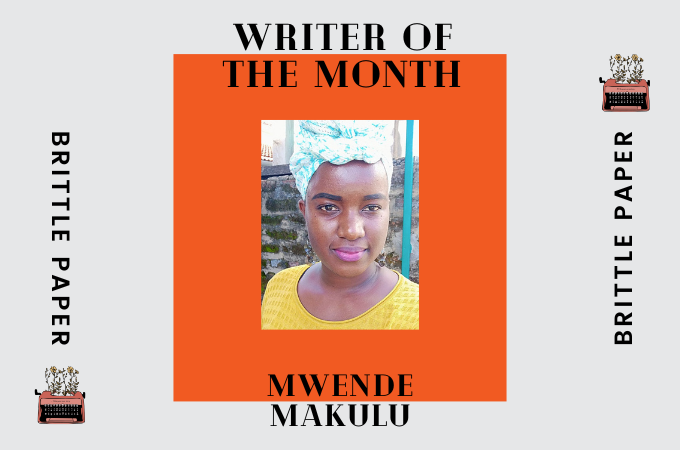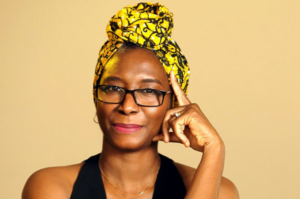
Brittle Paper’s Writer of the Month for October is Mwende Makulu!
Mwende Makulu is an engineer and writer from Kenya. Her writing journey began in Eastern Kenya during her primary school years when she would create compositions fancied by her family, teachers, and friends. Years later, Mwende undertook a different path and got her Mining Engineering degree from Taita Taveta University. Despite this, she maintains that writing is what she enjoys most.
In 2020, she was among the writers that made it to the anthology list of the inaugural Toyin Falola Short Story Prize. Her short stories have also been published by the Africa Book Club and Kalahari Review prior to Brittle Paper. She also enjoys writing poems and is currently working on her debut novel.
An avid fan of stories written or told in any form, Mwende believes that stories are not just stories. They are the very weapon of change if not the guidebook itself. And on that powerful note, here is Brittle Paper’s October Writer of the Month!
Brittle Paper
Mwende, congratulations on being October Writer of the Month! Your piece “Going Home” was such a beautiful and touching piece and the minute I saw the submission, I was set on you becoming this month’s pick. You mentioned being a writer and a recovering engineer. Those two certainly make an interesting combination. How long have you been juggling those two?
Mwende Makulu
I’m honoured to be the writer of the month. I think I have a goofy smile on my face even as I answer this [laughs].
I’ve been a writer for as long as I can remember. My parents cultivated a heavy reading culture in me and my siblings since we were young, and my father may be the biggest Achebe fan I know of. I think his passion for books might have rubbed off on me, and that formed a pretty solid foundation for me choosing to write. I didn’t realise how good I was until my father pointed out that my stories were really creative and good.
I think there was always a tendency for me to downplay it because, well, he’s family, and he might have felt obligated to offer the compliments. But my teachers also noticed and encouraged it as early as my primary school years. I also just really enjoyed it, so I pretty much decided that I would be a writer very early on in my life. However, no one tells you to choose writing as a full-time thing. Creative courses were and may still not be encouraged in most schools. Creativity is like a side dish, and you have to have the main dish. Engineering was my main dish. By the time I knew it’s not what I really wanted, I was so deep in it, I couldn’t come out. Now that I have graduated, I’m trying to break those shackles and be more receptive to writing. I think it’s okay to want to be a full-time creative, and to treat other things as side dishes, and I’m glad that people are beginning to see that now. Therefore, I am a recovering engineer and a full-time writer.
Brittle Paper
I thought “whether I have found a blanket that can comfortably wrap around me” was my favourite quote from you but no. Now it is “I am a recovering engineer and a full-time writer”.
So, as a budding creative, you had your parents and teachers help in nurturing this talent. Now that you’re a full-time writer though, what aids your inspiration?
Mwende Makulu
I love to observe nature and people, and these two have become my main inspirations. I think taking time to just observe and listen sparks my creativity. I come up with the most brilliant ideas when I’m least thinking about writing, and often this is when I’m taking walks or watching the sky, or engaging in conversations with others.
In the literary scene, it’s quite difficult to choose one person who inspires my writing. I’ve fallen in love with different writers at different times. When I was younger, it used to be Cyprian Ekwensi and Meja Mwangi. Then came Ngugi wa Thiongo and Achebe. Later, Chimamanda Adichie, Sefi Atta, Margaret Ogola, and Khaled Hosseini. However, I think I will always go back to Adichie and Hosseini, no matter how many times I’ve read them, even if it’s just to check my favourite lines from their books. Otherwise, I think that there’s something to learn from every book, so I try to keep my mind open no matter who I am reading.
Brittle Paper
My love for African literature started off with Cyprian Ekwensi and Meja Mwangi and those names have been a big inspiration to me and my craft as well.
Given your array of literary loves, what would you say is your own writing process?
Mwende Makulu
Well, I am certainly not the organized writer in the movie who has numerous coloured sticky notes on a whiteboard, coloured pens, an unhealthy amount of coffee, and a mantra to chant once in a while. I’m a messy writer. My writing process is often random. Sometimes I know the beginning and end of a story before I begin to write. At other times, I know things that only fall in the middle of a character’s journey and I have to figure out how to begin and end the story. However, I think there is beauty in randomness because it gives me the chance to explore all the different places the story wants to take me to at the same time as it does my character.
I also try to follow the writing advice that I learned a few years ago, but I can’t remember whom I learned it from, that is, writing the first draft in a single sitting. I find that I can then capture as many raw and unfiltered ideas as I can prior to revising the story.
Brittle Paper
As a reader, I much prefer your way of writing because it sounds whimsical but as an editor, it makes me a little anxious [laughs].
Your Instagram mainly showcases your poetry. Do you have a preference when it comes to short stories and poetry?
Mwende Makulu
I do not have any preference. I find that each genre serves its own purpose at different times for me. When I want to write about a spontaneous thought that has just come into my mind at the spur of the moment, I lean towards poetry. When I want to explore a larger theme, short stories come in handy for me. Also, I think that writing a novel is a huge commitment, and when I began to write and share my work, I did not feel well prepared to write large pieces of work, so poetry and short stories came in handy.
Brittle Paper
Now, let’s chat about “Going Home”. The story has such a warmth to it, and given the comment section, I am not the only one who thinks this. How did you come to write this particular piece? And do you usually focus on emotion and family in your work?
Mwende Makulu
I wrote the story “Going Home” immediately after coming from my sister’s dowry negotiation ceremony. At first, I didn’t want to include the introduction ceremony part. It was the first I had been home in a while and I wanted to write about how different home felt for me in those days when I was younger, and I visited often, and now that so many things had changed. That came with the overall and simultaneous feeling of loss and happiness, and I decided to portray both.
I do not think that I was conscious about my work primarily being focused on the family unit until you mentioned it. Now, that I’ve reflected on most of it, I see that family is a recurring theme. But I do think I’m deliberate about tapping into a reader’s emotions because there is something universal about emotions. I think that makes it quite tasking to write but at the end of the day, what I want is for people to identify with an emotion provoked by a story I’ve written. I think emotions are an effective means of communication.
Brittle Paper
On that note, we will get to read a new piece from you on Friday. Without giving too much away, what can you tell our readers about Friday’s story?
Mwende Makulu
I think we’ve figured out the recurring theme – family. It’s also quite emotional and gravitates around the theme of loss. And I know some might be, “God, another emotional story!” But I hope the readers love the story, with all its ups and downs.
Brittle Paper
If they are anything like me, they cannot wait for the new story.
Before we go, apart from your writing, Mwende, what is one thing about yourself that you want to share with our readers? Anything.
Mwende Makulu
I have locs now. No. I’m not a Rastafarian. Thank you for offering, but I don’t do weed. I do not think I’ll go to hell because of locs. Seriously. I have googled it. It’s only a hairstyle for me.
Brittle Paper
I think that PSA is a great note to end on. Thank you, Mwende, for this wonderful interview and for being such a fantastic contributor to our publication.
For more of Mwende’s work, be sure to check back in on Friday, and for more interviews with our writers, check out our last month’s with Franklyn Agbebaku here.








Obinna Emeka October 03, 2022 11:26
Headed for the top, this one.